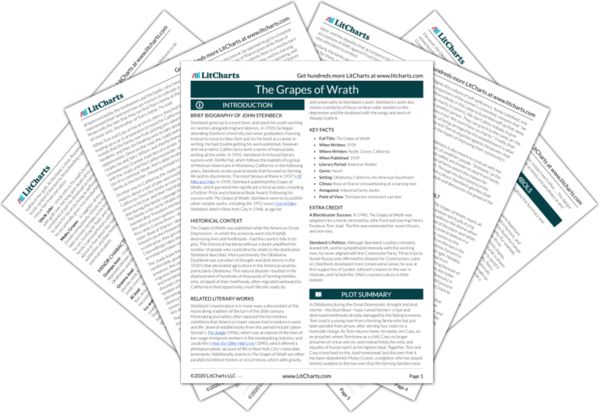Summary
Analysis
The Joads arrive at the Weedpatch government camp. A night watchman tells Tom that the government camp has no police presence, as the migrants elect their own police. They also elect representatives to a Central Committee, which governs the camp.
The camp’s effective self-sufficiency illustrates that the migrants are more powerful and more efficient when they band together.
Themes
Tom has breakfast with Timothy and Wilkie Wallace, who offer to try to get him a job at the farm that employs them. When the three arrive at the farm, the owner, Mr. Thomas, tells them that the Farmer’s Association—which is run by the bank—has demanded that he pay his workers no more than 25¢ an hour, down from their usual 30¢. The three men reluctantly agree to the pay cut.
Mr. Thomas’s hands are tied by the greedy system of which he is a reluctant part. Like the farmers, he must follow the unfair directions of his higher-ups in order to stay afloat.
Themes
Thomas then nervously tips the men off about the Association’s plans to incite a fight in the government camp at the upcoming Saturday night dance. The Association doesn’t like the camp’s independence, and plan to use this riot as an excuse to bring in police to destroy the camp.
At the camp, Pa, Al, and Uncle John prepare to search for work. As Ma cooks breakfast, the camp manager, Jim Rawley, comes by to introduce himself. Ma is initially suspicious of his clean clothes, but she is quickly won over by the courteous and sympathetic welcome he extends.
Jim Rawley is a glimmer of humanity amidst the inhumanity of the migrant laborer lifestyle, and he represents the good that can come from collaboration in the Okie community.
Themes
Get the entire The Grapes of Wrath LitChart as a printable PDF.

Rosasharn is approached by a religious zealot named Mrs. Sandry, who warns Rosasharn about the dangers of immoral behavior—especially the intimate dancing that takes place at the camp’s Saturday dances. Mrs. Sandry implies that if Rosasharn participates in these activities, she risks suffering a miscarriage. After Mrs. Sandry leaves, Rosasharn confesses to Mr. Rawley that she and Connie danced intimately back home. Mr. Rawley comforts her and tells her not to worry about Mrs. Sandry’s superstitions.
Mrs. Sandry’s religion revolves around judging others; these are the set of ideas Casy abandoned. This black-and-white depiction of righteousness and sin is designed to divide people, not promote unity: Mrs. Sandry elevates herself at the expense of credulous people like Rosasharn. Rosasharn’s insecurity and guilt grow.
Themes
The three women in charge of the camp’s Ladies’ Committee visit Ma and Rosasharn and explain how their committee regulates some aspects of camp life, particularly sanitation. The three women are stern but caring, and during their conversation with the Joad women, they offer emergency assistance to a woman whose family has run out of food. They emphasize that this aid is not charity.
The women’s serious treatment of mundane issues of camp life demonstrates their dignity and composure. Their willingness to offer help—and the needy woman’s reluctance to accept it—also reflects this dignity. The people of the camp are determined to exist as self-sufficiently possible.
Themes
Mrs. Sandry finds Ma and tries to preach to her, but Ma chases her off with a stick. Mr. Rawley appears again to defuse this situation and apologizes for Mrs. Sandry’s behavior.
Ma is wiser and less superstitious than Rosasharn, and has no patience for Mrs. Sandry’s sanctimoniousness.
Themes
Pa, Al, and Uncle John come home empty-handed: they couldn’t find work. Ma is hopeful, trusting that Tom has found work.
Despite having little reason to be hopeful, Ma remains optimistic about the family’s new situation, and about Tom.
Themes












